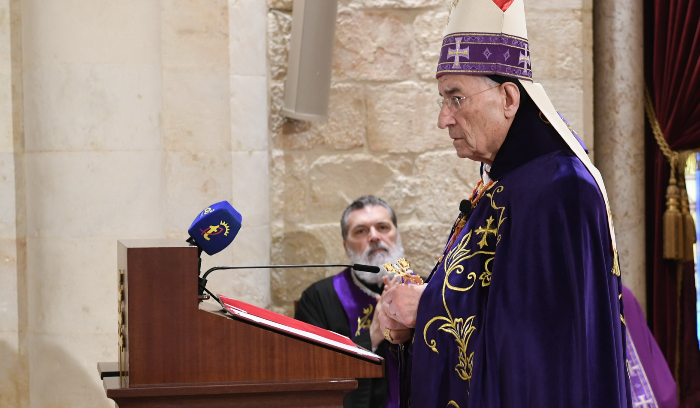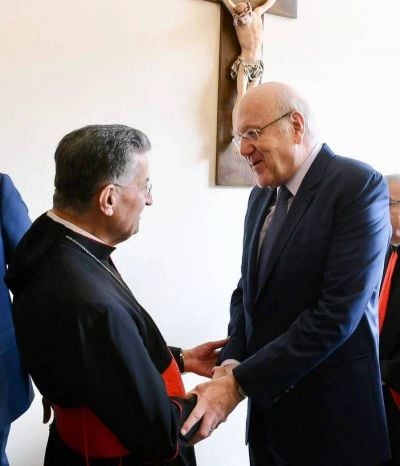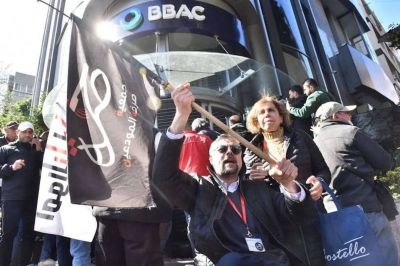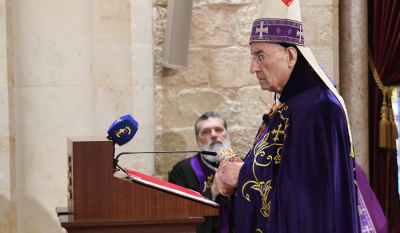
The head of the Maronite Church Bechara al-Rai celebrates Sunday mass. (Credit: NNA)
BEIRUT — The head of the Maronite Church, Bechara al-Rai, expressed on Sunday his fear of a "prolonged" presidential vacuum in Lebanon, pointing to "individual and partisan interests" that have prevented Parliament from electing a successor to Michel Aoun since the end of his term on Oct. 31. The patriarch also defended private banks and the Banque du Liban, after a series of lawsuits filed by the prosecutor general at the Court of Cassation of Mount Lebanon, Ghada Aoun, against several banking institutions, in a country in the midst of economic collapse since 2019.
During his Sunday homily, Archbishop Rai denounced an "attack on the head of state [position], while Parliament refuses to elect a president of the republic because of individual and partisan interests." He then pointed to a desire to "protect projects that involve Lebanon and the presidential election in a regional and international game," warning against a risk that the new president "will not emanate from the will of the Lebanese people but from projects in the Middle East."
"We hope that the ongoing negotiations between the friends of Lebanon about a solution take into consideration the interest of the country regardless of the settling of scores in the region," he added.
In early February, the heads of Lebanon's churches asked Rai to bring together Christian MPs, who remain deeply divided and unable to agree on a candidate. Delegated by Rai, the Maronite Bishop of Antelias, Antoine Bou Najm, met with, among others, head of Free Patriotic Movement MP Gebran Bassil, one of the first to have urged Bkirki to sponsor a dialogue dedicated to the presidential elections, and the leader of the Lebanese Forces, Samir Geagea.
A meeting in Paris earlier this month brought together representatives from Egypt, France, the United States, Qatar and Saudi Arabia to discuss the profile of the ideal presidential candidate in Lebanon, his political line and his economic and financial roadmap. No official communique was issued after this meeting, and the protagonists say that other meetings are expected to take place.
According to the patriarch, "the problem is that each party refuses any concession to facilitate the election."
"If this logic devoid of responsibility, conscience and respect for national duty continues, we fear a prolongation of the presidential vacuum, as the majority of reports indicate," he warned.
Bishop Audi castigates
Addressing the political crisis in his Sunday homily, the Greek Orthodox Metropolitan of Beirut, Elias Audi, also castigated the blocking of the presidential election. "Why don't the people who refuse to blockade agree to elect an honest person with a sense of leadership?" he asked. "Were you elected to blockade or to work and be productive?" he railed, addressing the MPs.
Lebanese MPs have failed, despite 11 dedicated parliamentary sessions, since last September to elect a new head of state due to a lack of political agreement. The name of the army's commander-in-chief, Gen. Joseph Aoun, is being put forward in some diplomatic and Lebanese circles as a candidate. The army chief has the potential to benefit from broad support from the Lebanese opposition, but Hezbollah appears to remain in favor of putting its support behind the leader of the Marada Movement, Sleiman Frangieh. FPM leader Gebran Bassil, a potential candidate and Hezbollah ally, is opposed to Frangieh's candidacy.
Defense of the banks
Patriarch Rai also on Sunday defended commercial banks and Banque du Liban (BDL; headed by a Maronite, Gov. Riad Salameh), after Judge Aoun brought new charges against several institutions and sought to advance the prosecution of charges already issued. Cardinal Rai denounced "personal and political conflicts" whose consequences "harm the banking system and Lebanon's reputation abroad in financial terms."
"We warn against any attack on the people's money on the one hand, and on the Lebanese banking system on the other, especially BDL which links Lebanon to the international monetary system," the prelate said. "Such an important issue should not be resolved in this way, when the judiciary is mired in political and personal" interests, he said.
Judge Aoun is accused by her critics of being close to the Bassil camp and to the FPM founder, former president Michel Aoun.
In recent days, after several decisions taken by the judge towards Bank Audi, the Société Générale de Banque au Liban (SGBL) and the Bank of Beirut, in the context of an investigation into the banks for "money laundering," caretaker Prime Minister Najib Mikati asked caretaker Interior Minister Bassam Mawlawi not to implement these decisions. This interference by the executive branch in judicial affairs was widely denounced, notably by the Higher Judicial Council, which demanded that the caretaker prime minister and interior minister reverse their position, which Mikati refused to do.


